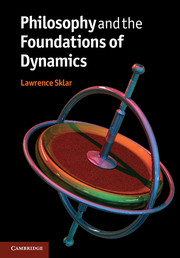Book contents
- Frontmatter
- Contents
- Chapter 1 Introduction
- Chapter 2 The pre-history of classical dynamics
- Chapter 3 The astronomical revolution
- Chapter 4 Precursors to Newtonian dynamics
- Chapter 5 The Newtonian synthesis
- Chapter 6 Philosophical aspects of the Newtonian synthesis
- Chapter 7 The history of statics
- Chapter 8 The development of dynamics after Newton
- Chapter 9 The “Newtonian” approach after Newton
- Chapter 10 From virtual work to Lagrange's equation
- Chapter 11 Extremal principles
- Chapter 12 Some philosophical reflections on explanation and theory
- Chapter 13 Conservation principles
- Chapter 14 Hamilton's equations
- Chapter 15 Canonical transformations, optical analogies and algebraic structures
- Chapter 16 The search for new foundations
- Chapter 17 New directions in the applications of dynamics
- Chapter 18 Spacetime formulations of Newtonian dynamics
- Chapter 19 Formalization: mass and force
- Chapter 20 Relationist dynamics
- Chapter 21 Modes of explanation
- Chapter 22 Retrospective and conclusions
- References
- Index
Chapter 12 - Some philosophical reflections on explanation and theory
Published online by Cambridge University Press: 05 December 2012
- Frontmatter
- Contents
- Chapter 1 Introduction
- Chapter 2 The pre-history of classical dynamics
- Chapter 3 The astronomical revolution
- Chapter 4 Precursors to Newtonian dynamics
- Chapter 5 The Newtonian synthesis
- Chapter 6 Philosophical aspects of the Newtonian synthesis
- Chapter 7 The history of statics
- Chapter 8 The development of dynamics after Newton
- Chapter 9 The “Newtonian” approach after Newton
- Chapter 10 From virtual work to Lagrange's equation
- Chapter 11 Extremal principles
- Chapter 12 Some philosophical reflections on explanation and theory
- Chapter 13 Conservation principles
- Chapter 14 Hamilton's equations
- Chapter 15 Canonical transformations, optical analogies and algebraic structures
- Chapter 16 The search for new foundations
- Chapter 17 New directions in the applications of dynamics
- Chapter 18 Spacetime formulations of Newtonian dynamics
- Chapter 19 Formalization: mass and force
- Chapter 20 Relationist dynamics
- Chapter 21 Modes of explanation
- Chapter 22 Retrospective and conclusions
- References
- Index
Summary
At this point it will be useful to interrupt our exposition of the historical development of dynamics in order to make some brief retrospective observations on how the development of the theory up to the later part of the eighteenth century carried with it an ongoing and evolving debate about the very nature of scientific explanation and scientific theory. What are the legitimate forms an explanatory account can take in science? What are the legitimate concepts that may be employed in such explanations? What are the fundamental posits of our theory, and what are the legitimate grounds by which we may justify our beliefs in the fundamental posits of our scientific account of the world?
The Aristotelian account of dynamics, and Aristotle's related account of cosmology, employed explanatory notions adopted from our pre-scientific, “intuitive” ways of answering “Why?” questions about the world around us. The ultimate origin of our employment of such explanatory structures is a worthy topic for exploration, but one we will not be able to embark on here. The notion of efficient cause presumably comes from our everyday experience, primarily, one imagines, experience of things pushing and pulling each other around. This “everyday dynamics” as it appears in our daily experience may very well be the source of our idea that explanations are to be given in terms of something like Aristotelian efficient causes. The idea of an explanation given in terms of final causes may have its origin in the fact that so much of our activity as agents is accounted for by means–ends explanations in which motives, purposes and goals play such a significant role. Again the idea that various components of living beings, their organs, all have their specific functions or roles, and that their existence must somehow be accounted for in terms of those roles, long predates science properly so-called.
- Type
- Chapter
- Information
- Philosophy and the Foundations of Dynamics , pp. 110 - 117Publisher: Cambridge University PressPrint publication year: 2012



